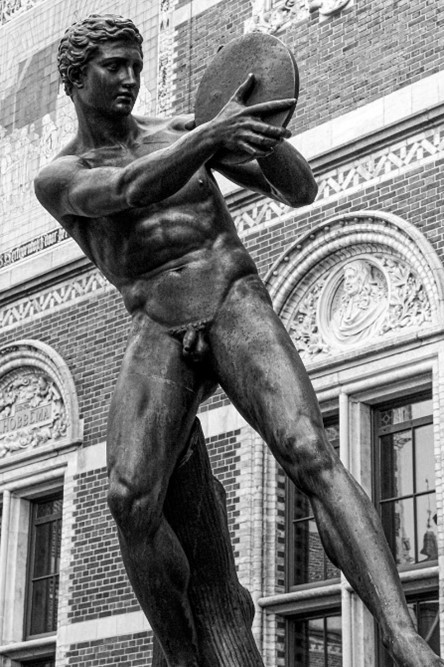Five Things the Olympic Games Tell Us About Ethics and Corruption
We are now in the midst of another round of the Olympic Games. For just over two weeks, they will be on the TV almost continuously. Around the world, people of all ages will be engrossed in the games. Some will turn up to work half asleep because they had to watch that hockey match or see the track and field finals.
Because of the levels of competition, the modern Olympics seem to always be marred by some form of controversy, corruption, or political statement.
Has it always been like that, and what does it tell us about corruption and ethical behavior. In this article, I look at five elements that are common to both.
The Ethical Intent of the Games
According to Greek mythology, the origins of the Olympic games go back to the Gods. Several Gods competed in the first games held in Olympia. Zeus wrestled his father, Kronos, for the throne. Apollo outran Hermes and beat Ares at boxing, and Herakles, often credited with founding the Olympic games, won victories in wrestling and the pankration, a no-holds-barred competition that was won by either one of the competitors giving up or dying.
The first written evidence of the games was in 776 BC when the Greeks began measuring times in Olympiads. From then on, they occurred every four years in honour of the God Zeus.
In 393 AD, the Roman Emperor Theodosius banned the games for religious reasons, and they did not reappear until 1898 when they were held in Athens.
The Olympic charter, a testament to the evolving ethical principles, was adopted two years before the first modern Olympics (held in Paris in 1900). It was updated in 2003 to reflect that all cities where the games were held must have a long-term plan for after the games, and again in 2014 to oppose discrimination.
The principles were simply an “internal philosophy” of the Games. The highest stated value of the Olympic movement, its raison d’etre, was humanity itself, its harmonious development, advancement, and self-expression through sport.
Hidden in the Olympic Code of Ethics are words like the highest degree of integrity, professionalism, and refrain from any act involving fraud or corruption.
Sadly, nearly every Olympic game since then has been dampened by some form of controversy, political statement, corruption, the unethical, forced displacement of local residents, athletes cheating, and let’s not even start on the money that is spent.
Despite every good intent and noble cause, the Olympics have always had a dark side. There are cries that they have just turned into countries flexing muscles and disguised power trips.

Corruption and cheating from the start
Have the numerous scandals of corruption and unethical behavior that now seem synonymous with modern Olympics been there right from the start?
Absolutely!
It was common for athletes to be bribed, and interfered with in various ways, from biting, eye-gouging, and testicle twisting.
Athletes were beaten with rods or flogged for fouling another player, for cheating to get an advantage, like starting early in a footrace, and for attempting to game the system that determined match-ups and byes. Fines were also imposed and used to create statues of Zeus (the father of the Olympic games), with inscriptions warning other athletes about foul play.
Even doping of sorts occurred. Not availed of modern medicines, athletes were urged to eat animal hearts, boiled hooves, testicles and semen, mushrooms, and herbs to make them stronger and enhance their performance.
Five things the Games show about corruption and ethics:
1. Different countries have different levels of interest and concern in corruption.
As I said in the opening paragraph, some people are obsessed with the Olympics, while others can’t wait for them to finish, seeing them as an intrusion into normal life.
Countries support their athletes to different levels with funding, grants, and supported travel, while others provide little or no support. Supporters may be interested in individual performances while others like team events. Some countries also provide handsome incentives for winning medals.
Only Great Britain, New Zealand, Norway, and Sweden do not provide monetary rewards. Among the highest rewards are Singapore (737,000), Taipei ($720,000), Hong Kong ($642,000), and Thailand ($365,000) for a gold medal.
Just like the Olympics, different countries and the people of those countries have different levels of interest and investment in compliance. This is reflected by the broad range of corruption indices worldwide that are published every year.
2. Compliance is up to the individual but affects the whole team
Track and field’s status now seems to have been displaced by swimming and gymnastics as the centre for cheating. There were potentially hundreds of athletes competing in the 2016 Rio Games who returned positive drug tests for banned substances.
Australian swimmer Mack Horton received significant criticism on social media for calling a fellow competitor (and perhaps not incidentally the gold medal winner) a drug cheat.
Whistleblowing in the Olympics? – unheard of!
This not only resulted in humiliation for the individual but also for the teams on both sides.
In the 2002 Winter Olympics, two sets of gold medals were awarded in pairs figure skating to the Canadian pair and the Russian pair after allegations of collusion among judges favored the Russian pair.
That same year, the mixed team normal hill event of ski jumping, the previous Olympic medalists, Austria, Germany, and Japan, as well as the former world championship medalist from Norway were all disqualified prior to the start due to the concern that their jumpsuits were not tight enough, which officials claimed gave them an unfair advantage.
The Japanese, Austrian, Norwegian, and German teams all suffered a heavy impact. Their disqualified athletes automatically received 0 points for failing to make an attempt, which placed the four teams in fourth, fifth, eighth, and ninth place, respectively.
During the 2020 Olympics, a British athlete tested positive for steroid-like drugs. The British team was disqualified and officially stripped of the silver medal, and all Great Britain’s relay team members had to return their medals.
When individuals behave unethically or corruptly, they affect a whole company or country. The same can be said for the Olympics, where an individual’s inappropriate actions can dash the whole team’s hopes.
3. There will always be people that cheat, and there will always be ways to cheat.
The original Olympic judges (Hellanodikai) had the reputation of acting fairly, even in the face of verbal harassment by athletes and spectators. Like competitors, they, too, swore to abstain from bribery.
Nonetheless, there are examples of judges expressing conflicts of interest and making decisions where kickbacks may have been involved such as the controversial judgment about the runner Leon of Ambricia in 396 B.C.
We still have the same issues of corruption; the stakes have just gotten higher because the rewards have gotten higher. Whether it be in business or in sports, there are those prepared to take the risk of getting caught if the rewards are high enough. Certainly, the opportunity to win a gold medal is a good incentive (if you don’t get caught).
4. The Olympic games and the concept of cheating, bribery, and corruption among officials have been and will be around forever.
Clearly there has always been cheating in the Olympic games. Some would say it is human nature. An extremely competitive person with slightly misaligned DNA seeks the opportunity to get one-up on their opponent by whatever means possible.
“As long as I don’t get caught, onwards to glory!”
As British cyclist David Millar aptly put it, “…human nature dictates that there will always be cheaters. That’s inevitable. Where there’s money involved and glory, there will be people that cheat, and there will always be ways to cheat.”
Corruption and cheating will always find new ways to prevail. In business (just as in sport), we see new and innovative ways for people to engage in wrongdoing every month.
5. People convicted of their crime should do their time
Bribery and Corruption, like the Olympic games, in my opinion, are at a crossroads.
If we do not hold people accountable for their actions, don’t we indirectly condone them?
Athletes and officials who cheat, like businesspeople and government officials who take and give bribes, should be held individually accountable.
People convicted of their crimes should serve their time, and if that means an athlete cannot ever compete in another Olympic games, then so be it!
History Continues to Repeat itself
The original ethical mandate of the Olympics established by the Greek Gods has not been lost. We would be naive to think that this Olympic Games would be any different from the controversies of previous games.
Even before the Paris Olympics started, French police raided the Olympic committee’s offices as part of an investigation into embezzlement of public funds and favouritism.
De Ja vu from the 2016 Rio Games, where the head of the organizing committee was sentenced to 30 years in prison for masterminding a bribery scheme. Last year, a member of the Tokyo organizing committee was awarded three times for accepting nearly a million dollars in bribes.
The question is not will these games be marred by controversy, but more of what type of controversy. It seems ripe for political statement with conflict in Gaza, primed for extensive drug abuse, and historically open to corruption and bribery.
Just like any form of business really!

